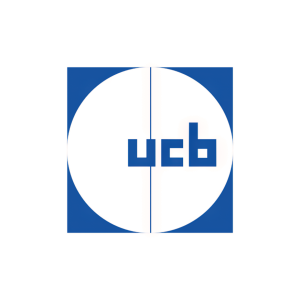UCB announces positive results from GEMZ Phase 3 study of fenfluramine in CDKL5 deficiency disorder
Rhea-AI Summary
UCB (OTC:UCBJY) announced positive Phase 3 study results for fenfluramine in treating CDKL5 deficiency disorder (CDD), an ultra-rare developmental and epileptic encephalopathy. The study met its primary endpoint of reducing countable motor seizure frequency and most key secondary endpoints.
The randomized, double-blind trial involved 87 patients aged 1-35 with CDD diagnosis and uncontrolled seizures. CDD affects approximately 1 in 40,000 to 60,000 live births. The drug demonstrated a safety profile consistent with previous studies in Dravet syndrome and Lennox-Gastaut syndrome. UCB plans to pursue regulatory approval for this potential new treatment option.
Positive
- Phase 3 trial successfully met primary endpoint and most key secondary endpoints
- Drug showed favorable safety profile consistent with previous studies
- Potential to address high unmet need in ultra-rare disease with limited treatment options
- Represents third successful DEE population for fenfluramine with positive Phase 3 results
Negative
- Full study results not yet disclosed
- Drug not yet approved by any regulatory authority for CDD treatment
News Market Reaction
On the day this news was published, UCBJY gained 0.88%, reflecting a mild positive market reaction.
Data tracked by StockTitan Argus on the day of publication.
- Phase 3 study met primary and most key secondary clinical endpoints
- This marks the third developmental and epileptic encephalopathies (DEE) population for fenfluramine with positive phase 3 results
- Results underscore the impact of UCB's continued investment in scientific innovation to advance new treatments for DEEs
- CDKL5 deficiency disorder (CDD) is an ultra-rare, severe DEE with an onset in early infancy with a high unmet need, and has limited treatment options
- CDD affects approximately 1 in 40,000 to 60,000 live births, with a median age of onset of six weeks1,2
- UCB plans to submit for regulatory approval to bring this potential treatment option to people living with CDD as soon as possible
"These results pave the way for creating significant therapeutic progress and represent an important milestone in UCB's mission to bring meaningful innovation to individuals and families affected by developmental and epileptic encephalopathies (DEEs). We are grateful to the patients, families, and researchers who made this progress possible, and we look forward to working with the health authorities to make treatment available as soon as possible," said Fiona du Monceau, Executive Vice President, Patient Evidence, UCB.
The primary endpoint of the study is based on the median percent change in countable motor seizure frequency (CMSF) between baseline and the titration plus maintenance phase, comparing fenfluramine with the placebo group.3 Full results will be presented at an upcoming scientific meeting.
CDD is an ultra-rare DEE with refractory infantile-onset epilepsy and severe global neurodevelopmental delays resulting in intellectual, motor, cortical visual, and sleep impairments as major features.1 It is caused by pathogenic variants in the cyclin dependent kinase-like 5 (CDKL5) gene located on the X chromosome. It is estimated that CDD affects approximately 1 in 40,000 to 60,000 live births.2
In the study, fenfluramine was generally well tolerated, and the safety profile was consistent with previous studies in DS/LGS.3 UCB is currently conducting an open-label, flexible-dose, long-term 54-week extension phase of the study to characterize the long-term safety and tolerability of fenfluramine in pediatric and adult individuals with CDD.4
In
For further information, contact UCB:
US Communications
Becky Malone
T +1.919.605.9600
becky.malone@ucb.com
Corporate Communications, Media Relations
Laurent Schots
T +32.2.559.92.64
Laurent.schots@ucb.com
Investor Relations
Antje Witte
T +32.2.559.94.14
antje.witte@ucb.com
Sahar Yazdian
T +32.2.559.91.37
sahar.yazdian@ucb.com
About UCB
UCB,
UCB Forward Looking Statement
This document contains forward-looking statements, including, without limitation, statements containing the words "potential", "believes", "anticipates", "expects", "intends", "plans", "seeks", "estimates", "may", "will", "continue" and similar expressions. These forward-looking statements are based on current plans, estimates and beliefs of management. All statements, other than statements of historical facts, are statements that could be deemed forward-looking statements, including estimates of revenues, operating margins, capital expenditures, cash, other financial information, expected legal, arbitration, political, regulatory or clinical results or practices and other such estimates and results. By their nature, such forward-looking statements are not guaranteeing future performance and are subject to known and unknown risks, uncertainties, and assumptions which might cause the actual results, financial condition, performance or achievements of UCB, or industry results, to be materially different from any future results, performance, or achievements expressed or implied by such forward-looking statements contained in this document.
Important factors that could result in such differences include but are not limited to: global spread and impacts of wars, pandemics and terrorism, the general geopolitical environment, climate change, changes in general economic, business and competitive conditions, the inability to obtain necessary regulatory approvals or to obtain them on acceptable terms or within expected timing, costs associated with research and development, changes in the prospects for products in the pipeline or under development by UCB, effects of future judicial decisions or governmental investigations, safety, quality, data integrity or manufacturing issues, supply chain disruption and business continuity risks; potential or actual data security and data privacy breaches, or disruptions of UCB's information technology systems, product liability claims, challenges to patent protection for products or product candidates, competition from other products including biosimilars or disruptive technologies/business models, changes in laws or regulations, exchange rate fluctuations, changes or uncertainties in laws and/or rules pertaining to tax and duties or the administration of such laws and/or rules, and hiring, retention and compliance of employees. There is no guarantee that new product candidates will be discovered or identified in the pipeline, or that new indications for existing products will be developed and approved. Movement from concept to commercial product is uncertain; preclinical results do not guarantee safety and efficacy of product candidates in humans. So far, the complexity of the human body cannot be reproduced in computer models, cell culture systems or animal models. The length of the timing to complete clinical trials and to get regulatory approval for product marketing has varied in the past and UCB expects similar unpredictability going forward. Products or potential products which are the subject of partnerships, joint ventures or licensing collaborations may be subject to disputes between the partners or may prove to be not as safe, effective or commercially successful as UCB may have believed at the start of such partnership. UCB's efforts to acquire other products or companies and to integrate the operations of such acquired companies may not be as successful as UCB may have believed at the moment of acquisition. Also, UCB or others could discover safety, side effects or manufacturing problems with its products and/or devices after they are marketed. The discovery of significant problems with a product similar to one of UCB's products that implicate an entire class of products may have a material adverse effect on sales of the entire class of affected products. Moreover, sales may be impacted by international and domestic trends toward managed care and health care cost containment, including pricing pressure, political and public scrutiny, customer and prescriber patterns or practices, and the reimbursement policies imposed by third-party payers as well as legislation affecting biopharmaceutical pricing and reimbursement activities and outcomes. Finally, a breakdown, cyberattack or information security breach could compromise the confidentiality, integrity and availability of UCB's data and systems.
Given these uncertainties, the public is cautioned not to place any undue reliance on such forward-looking statements. These forward-looking statements are made only as of the date of this document, and do not reflect any potential impacts from the evolving event or risk as mentioned above as well as any other adversity, unless indicated otherwise. The company continues to follow the development diligently to assess the financial significance of these events, as the case may be, to UCB.
UCB expressly disclaims any obligation to update any forward-looking statements in this document, either to confirm the actual results or to report or reflect any change in its forward-looking statements with regard thereto or any change in events, conditions or circumstances on which any such statement is based, unless such statement is required pursuant to applicable laws and regulations.
References
1 Zuberi et al. ILAE classification and definition of epilepsy syndromes with onset in neonates and infants: Position statement by the ILAE Task Force on Nosology and Definitions. Epilepsia.2022;63(6):1349-97.
2 Overview of Medical-scientific Research in
3 UCB data on file. 2025
4 ClinicalTrials.gov. NCT05064878. Available at: https://clinicaltrials.gov/study/NCT05064878. Accessed: June 2025.
5 FINTEPLA (fenfluramine)
FINTEPLA® is a registered trademark of the UCB Group of Companies.
©2025 UCB, Inc.,
US-FA-2500517
Date of preparation: June 2025








